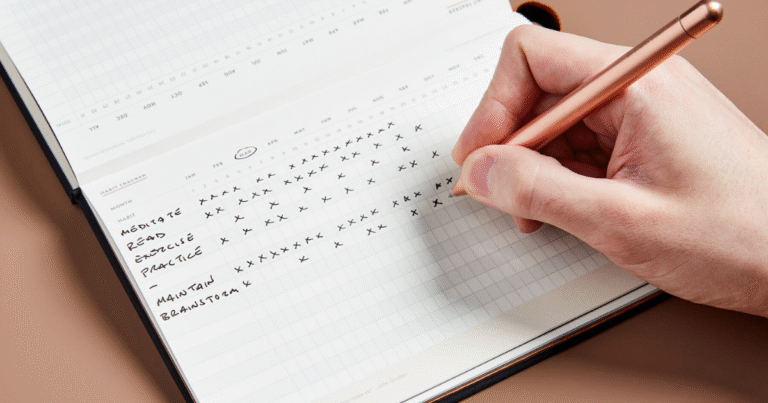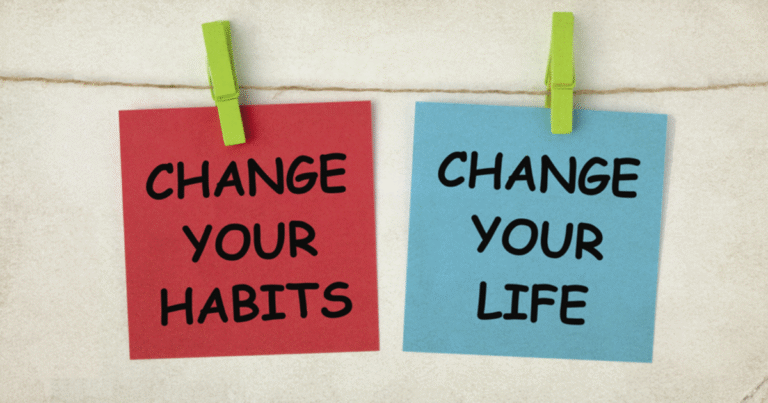How Good Habits Can Change Your Life

Table of Contents
Your daily routines greatly affect your wellbeing and success. Consistent daily habits can make a big difference in your health. By adding good habits to your day, you can work better, feel happier, and have more energy.
Developing healthy daily habits requires effort, but the results are truly rewarding. As you start positive routines, you’ll see your life improve. Positive habits help you reach your goals, stay strong, and live a balanced life.
Key Takeaways
- Good habits play a crucial role in determining overall wellbeing and success.
- Consistent positive habits can improve physical and mental health.
- Incorporating healthy routines enhances productivity and boosts mood.
- Developing a good habits requires time and commitment.
- Positive daily habits can lead to a more balanced lifestyle.
The Science Behind Habit Formation
Habit formation starts in the brain. When you do something over and over, it becomes automatic. This frees up your mind for other things.
How Your Brain Creates Habits
Your brain uses the basal ganglia to make habits. This area is key for habits and routines. As you keep doing something, the brain’s pathways get stronger.
The Neurological Basis of Habits
Habits involve many brain parts, like the prefrontal cortex and basal ganglia. This complex process makes habits strong and hard to change.
The Habit Loop: Cue, Routine, Reward
The habit loop has three parts: a cue, a routine, and a reward. Knowing this loop helps you form healthy habits and break bad ones. By finding the cue and reward, you can change the routine. This uses the brain’s pathways for good.
Why Good Habits Are Life-Changing
Positive habits have the power to change your life for the better. By adding these habits to your daily routine, you can see big improvements in many areas of your life.
The Compound Effect of Daily Actions
Small, consistent actions can lead to big changes over time. This idea, called the compound effect, shows how important it is to keep up with productive habits every day. As you stick to these habits, you’ll see a big improvement in your well-being and success.
How Habits Shape Your Identity
Your habits show who you are and shape your identity. By choosing certain habits, you’re not just changing what you do. You’re also changing how you see yourself.
From Actions to Self-Concept
Doing the same actions over and over makes them part of who you are. For example, regular exercise can make you see yourself as fit. Reading every day can make you see yourself as a learner. This change from actions to self-concept is a strong way to build a better, more positive identity.
The Power of Good Habits in Personal Development
Good habits are key to growing personally. They help you succeed automatically and lessen the need to make many decisions. By adding positive routines to your day, you make reaching your goals easier.
Automating Success Through Routine
Successful people often have routines for everyday tasks. This frees up their minds for bigger decisions. For example, a regular morning habits can make you more productive and start your day right.
By automating simple tasks, you can tackle bigger challenges. This helps you move closer to your goals.
Creating Mental Space for Growth
Good habits clear your mind by cutting down on daily decisions. This mental clarity lets you focus on growing and improving. A big part of this is reducing decision fatigue.
Decision Fatigue Reduction
Decision fatigue happens when making too many choices wears you down. Routines help you make fewer decisions, saving mental energy. For instance, planning your outfits or meals ahead can cut down on decision fatigue.
Some ways to do this include:
- Preparing your clothes or meals for the next day
- Creating a schedule for recurring tasks
- Limiting the number of choices you make daily
By using these strategies and building good habits, you can improve yourself. You’ll get closer to your goals, just like many successful people do.
Step1: Identifying Habits Worth Building
Starting to build good habits means knowing which ones are important. You need to pick the daily habits that will really change your life for the better.
Assessing Your Current Habits
Start by looking closely at your daily routine. Track your activities from morning to night. Note how you spend your time and find patterns in your behavior.
The Habit Audit Process
To audit your habits, follow these steps:
- Keep a habit journal for a week to track your daily activities.
- Identify habits that are serving you well and those that are holding you back.
- Analyze the reasons behind your habits, understanding what triggers them and what rewards they provide.
Choosing Habits Aligned With Your Goals
After reviewing your current habits, pick new ones that match your goals. This means setting clear goals and finding healthy habits to help you reach them.
For instance, if you want to get healthier, consider habits like regular exercise, eating well, or getting enough sleep. Aligning your habits with your goals helps you create a path to success and move closer to your goals.
Step2: Setting Up Your Environment for Success
Creating a space that supports success is key. Your surroundings shape your daily actions and choices. By setting up your environment to align with your goals, you boost your habit-forming success.
Designing Your Physical Space
Your physical space can either help or hinder your progress. Start by decluttering and organizing it. This keeps you focused and away from distractions. Think about how you arrange your space to boost productivity.
Creating Habit Triggers
To build good habits, use triggers to remind you. Place visual cues in key spots. For example, put your meditation cushion near your bed to start a morning meditation habit.
Eliminating Friction Points
Friction points are barriers to your habits. Identify and remove these obstacles. For example, remove TVs and devices from your bedroom to start a bedtime reading habit. This creates a space that encourages positive habits and productive habits.
By using these strategies, you’ll set up an environment that supports your goals and helps you form lasting habits.
Step3: Implementing Good Habits Using Proven Methods
To make lasting changes, it’s key to use proven methods for good habits. By adding effective strategies to your daily life, your new habits will stick. This leads to big improvements in your life.
The 1% Improvement Principle
The 1% improvement principle is about making small changes daily. Improving by just 1% each day can lead to big gains over time. It makes building new habits less scary and more doable.
For example, to improve your reading, start by reading for one minute a day. Increase this by a minute or two each day. Soon, you’ll be reading for longer without even noticing.
Habit Stacking Techniques
Habit stacking builds new habits on top of old ones. It uses your current routines to make new habits easier to adopt.
Attaching New Habits to Existing Routines
To stack habits well, find a habit you already do daily, like brushing your teeth. Then, add a new habit right after it. For example, flossing after brushing. This creates a trigger to remember your new habit.
Using Implementation Intentions
Implementation intentions mean planning when and where to do a new habit. This method is very effective in keeping you on track with new habits.
For instance, to start meditating, plan to meditate at 7:00 AM in your living room. By setting a specific time and place, you make a clear plan to follow your new habit.
By applying these methods, you can create lasting good habits. These habits will improve your life in meaningful ways.
Essential Daily Habits for Physical Wellbeing
Your physical wellbeing is greatly affected by your daily habits. By adding healthy habits to your routine, you can improve your health and life quality.
Morning Movement Routines
Starting your day with exercise boosts your energy and sets a positive mood. Simple activities like stretching, yoga, or a short walk are excellent choices. Morning exercise improves your mental focus and physical health.
Nutrition and Hydration Habits
Eating well and staying hydrated are key for your health. Eat a variety of whole foods like fruits, veggies, whole grains, and lean proteins. Drinking at least eight glasses of water a day is also crucial.
Meal Preparation Strategies
- Plan your meals ahead to eat healthy.
- Make meals in bulk to save time during the week.
- Make sure your plate has different colors for more nutrients.
Sleep Optimization Practices
Getting enough sleep is essential for your health. Aim for 7-9 hours each night and have a bedtime routine. A cool, dark bedroom also helps improve sleep.
By adding these habits to your life, you can greatly improve your physical wellbeing and life quality.
Productive Habits of Successful People
Successful people often say their success comes from productive habits. By picking the right habits, you can work better and reach your goals faster.
Time Management Techniques
Good time management is key to being productive. Successful people use many ways to manage their time well.
Time Blocking and Prioritization
Time blocking means setting aside big chunks of time for important tasks. It’s also important to focus on the most urgent tasks first. These methods help you work more efficiently.
Deep Work Practices
Deep work means focusing deeply on hard tasks without distractions. It’s a skill you can get better at with practice. Adding deep work to your day can help you do more in less time.
- Schedule deep work sessions in your calendar.
- Eliminate distractions during these sessions.
- Take regular breaks to recharge.
Continuous Learning Habits
Successful people always keep learning. They know to stay ahead, they must keep learning and improving.
To start learning more, you can:
- Read books and articles in your field.
- Go to conferences and workshops.
- Take online courses to learn new skills.
By adding these productive habits to your daily life, you can work better and succeed more.
Mental Health Habits That Transform Your Mindset
Improving your mental health is easier than you think. Just add simple habits to your daily routine. This way, you’ll face life’s challenges better and feel more positive.
Daily Mindfulness Practices
Mindfulness means being fully present without judgment. Daily mindfulness practices can lower stress and anxiety. Try deep breathing, body scan meditation, or mindful walking every day.
Gratitude and Positive Psychology
Gratitude can change your outlook to the positive. Try gratitude journaling or share three things you’re thankful for daily. This boosts your mental health.
The Five-Minute Journal Method
The Five-Minute Journal helps you reflect on your day. It encourages you to note what you’re grateful for and plan for tomorrow. It’s a simple way to stay positive. Even a few minutes a day can bring meaningful change
Stress Management Routines
Managing stress is key to good mental health. Routines like yoga, progressive muscle relaxation, or journaling can help. These habits make you better at handling stress and keep your mind healthy.
By adopting these positive habits and healthy habits, you can change your mindset. This will improve your mental wellbeing.
Relationship-Building Healthy Habits
Building positive habits can change your personal and work life. Simple practices can help you connect deeper with others. This makes your relationships stronger and more meaningful.
Active Listening Techniques
Active listening is key to better relationships. It means really listening to what someone says and understanding their view. To listen well, keep eye contact, don’t interrupt, and ask questions.
Some good ways to listen include:
- Paraphrasing to make sure you get it right
- Reflecting on their feelings
- Using body language like nodding
Regular Check-in Practices
Regular chats keep you close to family and friends. They stop you from feeling alone and make your bonds stronger. Plan regular times to catch up, like weekly calls or monthly dinners.
When you check in, be there and pay attention. For online chats, try:
- Video calls for a real face-to-face feel
- Sharing what’s new in your life
Digital Detox for Better Connections
Today, we often forget about people because of our screens. Taking breaks from devices helps you connect better with others. Make times or days where you choose to be with people instead of screens.
Overcoming Challenges in Positive Habits Formation
Building positive habits comes with its own set of challenges. It’s a journey that needs persistence and the right strategies. Understanding how to face common obstacles is key.
Dealing With Resistance and Procrastination
Resistance and procrastination can block your path to good habits. To beat them, you must know why you resist and find ways to overcome it. Breaking down big goals into smaller tasks makes them less scary and helps you move forward.
Recovering From Habit Breaks
Even with the best intentions, you might miss a day or two. The key is not to get discouraged but to get back on track as quickly as possible. Using the “Never Miss Twice Rule” is a good strategy.
The Never Miss Twice Rule
This rule means getting back to your habit right after a miss. It ensures you don’t miss twice in a row. This rule helps build consistency and strengthens your habit.
Adjusting Habits That Aren’t Working
Not every habit fits everyone. That’s perfectly fine. The key is to identify what’s not working and adjust accordingly. Look into why it’s not working and change the habit or how you do it.
Conclusion: Your Journey to Transformation Through Good Habits
Learning about good habits can change your life. By adding positive, healthy, and productive habits to your day, you can see big improvements. This can lead to better wellbeing and success.
Successful people often start their day with exercise, eat well, and get enough sleep. These habits help you build a strong routine. This routine can shape who you are and help you succeed.
To keep moving forward, pick habits that match your goals. Use methods like habit stacking and implementation intentions to make changes last. This way, you’ll grow, face challenges, and reach your goals.
Begin your journey today by finding the habits you want to build. Make your environment support your success. With hard work and the right plans, you can build good habits. These habits will lead you to a more rewarding life.






